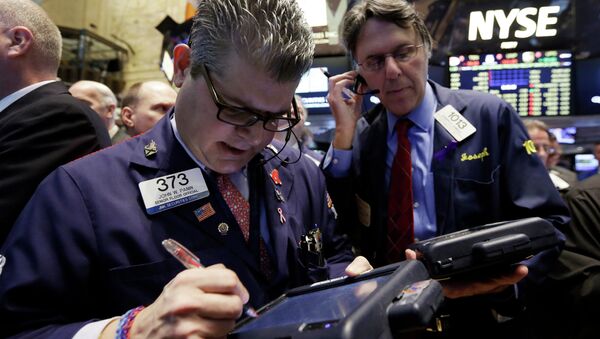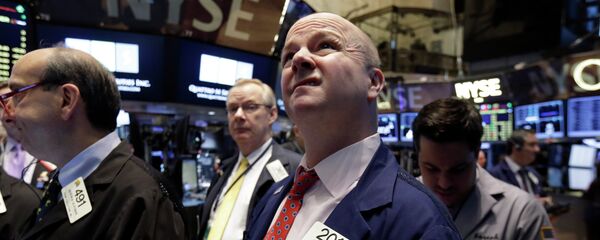Monday's trading sessions in Asia-Pacific ended mostly in the green, with Chinese equities in Hong Kong advancing at their fastest this year on yesterday's PBOC pro-QE traction. Hopes for Beijing's greater infrastructure spending in order to spur the real economy also contributed to investors' optimism. The infrastructure-allocated money in non-transparent mainland China's economy will eventually end up in the sector promising greater profits to the governmental money-managers, no wonder a large part of the growth-stimulation money liquidity will end up in stock markets — something investors are acutely aware of.
On Shanghai bourses, shares edged 2.6% up, hitting seven-year highs, mostly due to gains in real estate, the latter advancing the most since 2009. However, greatest gains were seen in Hong Kong, where the Hang Seng China Enterprises Index jumped 3.8% after Beijing lifted their ban for mainland open-end funds to invest in Hong Kong equities. Consequently, plentiful mainland capital flew into the island's stock markets, seeking safe havens rather than investment business opportunities.
For instance, after People's Bank of China (PBOC) head Zhou Xiaochuan made his policy remarks yesterday, equities of Industrial and Commercial Bank of China added 3% in Hong Kong. Zhou noted economic growth had paused ‘a bit', and this little remark might have become a trigger for the money flight to Hong Kong. Hong Kong Exchanges and Clearing Ltd. jumped 6.4% on the money influx from mainland.
The CSI 300 Index rose 2.9%, and the broader Hang Seng Index added 1.7%.
In Japan, the Nikkei 225 Index rose 0.8% at the close despite ditching into the red early in the day due to softer economic data. MSCI APEX san Japan broader index added 0.4%, erasing its early losses as well.
The whole region of Asia-Pacific cheered Monday due to Friday's US Fed pledges of more tightening coming later this year, as well as Sunday's easing promises in China. Investors are hoping to increase their profits in the coming situation. Also, as a result of Janet Yellen's pro-tightening stance, the US dollar rose against the yen to 119.21, still below its highest of the month at 122. 04, nonetheless, good for the Japanese manufacturers.
In Europe, stocks also rallied, erasing last week's losses, driven by buoyant advance in tech sector, backed by the news of mergers and acquisitions and suggesting a solid backing from the real economy.
The euro slid against the dollar to $1.0861, providing a yet another source to investors' optimism. Yet, the European currency is still above its lowest of $1.0457, posted some two weeks ago.
US WTI crude slipped $0.77, selling at $48.10/bbl, Brent crude retreated to $55.99 as Iran signaled its readiness for a compromise on its nuclear programme.
More factors to watch the current week are preliminary inflation readings in the Eurozone to be issued Tuesday, as well as manufacturing surveys in China Wednesday. This Friday the US Department of Labour will also release its employment report.
Generally, a higher inflation in Europe and a weaker business activity in mainland China's manufacturing are expected, both bearing positive signals for the markets. As for the US jobless report, a consensus estimate would be some 244,000 new jobs in the US non-farm sector. If matched or beaten, this outgoing March would be the 13th consecutive month of more-than-200,000 monthly gains in US jobs, the best since 1994-1995. If undershot, the Fed tightening prospects will be put in question once again, and we shall see the dollar retreating.
Another concern is Greece, which will exhaust its disposable monetary funds by 20 April, meaning it is going to have to address its international creditors once more, the latter most likely responding with an agenda of more structural reforms. As Athens is seemingly reluctant to conduct reforms, some prolonged period of uncertainty will happen, rendering investors jumpy.
Still, no matter the odds, this is a happy-end story so far, with the world's most prominent economies continuously expanding, and the US even returning to monetary normality.




